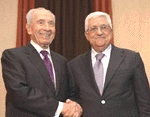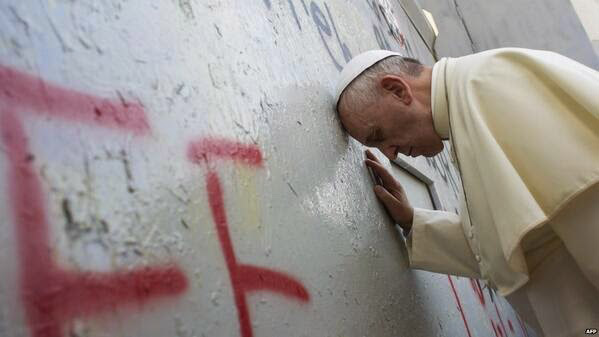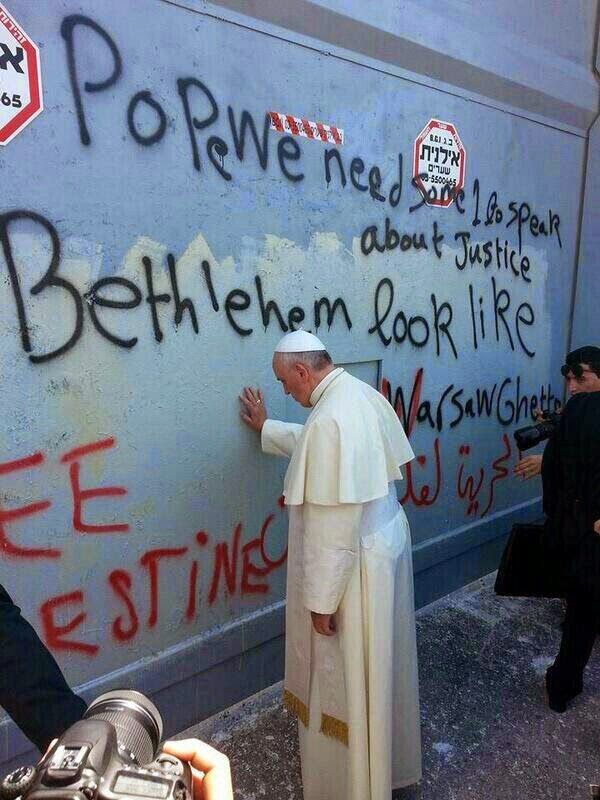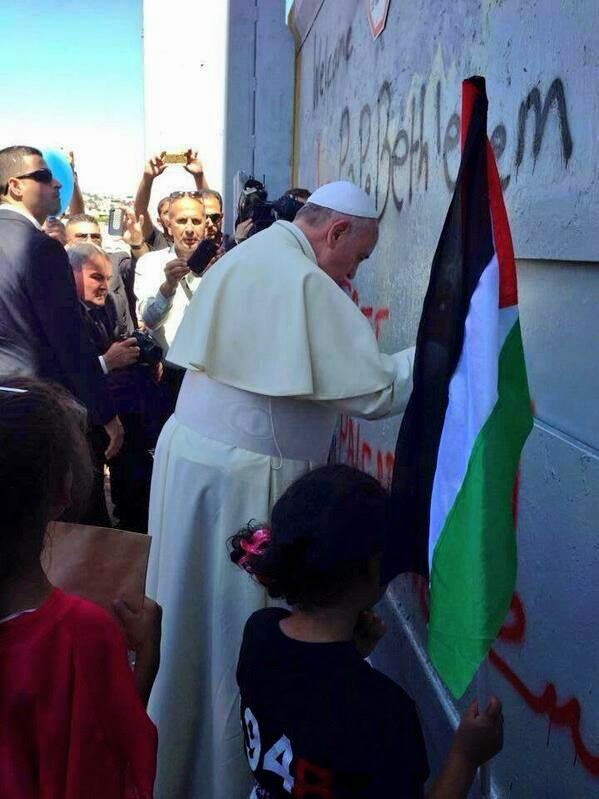“I wish to invite you, President Mahmoud Abbas, together with President Shimon Peres, to join me in heartfelt prayer to God for the gift of peace. I offer my home in the Vatican as a place for this encounter of prayer.” —Pope Francis this morning in Bethlehem; the words were spontaneous, not part of his prepared text; they mean that the Pope is inviting the two leaders to come to the Domus Santa Marta in the Vatican to pray with him and seek peace
“At the ‘end time’ the Lord’s Spirit will renew the hearts of men, engraving a new law in them. He will gather and reconcile the scattered and divided peoples; he will transform the first creation, and God will dwell there with men in peace.” — Catechism of the Catholic Church, paragraph 715
============================
Two Moments… and a Third…
Pope Francis during his visit to the Holy Land has made peace the central message of his teaching.
Two moments from the visit today, to Bethlehem, the birthplace of Christ, stand out.
(1) Francis, driving in his popemobile near Bethlehem, asked that his car be stopped and, in a gesture that was not part of the program, he got out of the car, walked to the wall nearby that was built to separate Israel from the Palestinian territories, and prayed briefly near the wall. He pressed his forehead against the wall, and placed his right hand against the wall.
(Here is a link to video of the event: https://www.romereports.com/pg156962-pope-francis-stops-popemobile-to-pray-in-front-of-the-wall-that-separates-palestine-and-israel-en)
The second: a few moments ago, also in remarks which also were not part of his prepared text, he invited the presidents of the State of Israel, Shimon Peres, and of the Palestinian territories, Mahmoud Abbas, to pray for peace, and he offered his own home in the Vatican as a place for peace talks between the two.

So Francis has made his own proposal for a “peace process,” inviting the two leaders of the two sides to come to live with him for a time in his own house, to pray privately and alongside him, in order to seek a just peace.
Here is the text of what Francis said in Bethlehem, just a few minutes ago:
In this, the birthplace of the Prince of Peace, I wish to invite you, President Mahmoud Abbas, together with President Shimon Peres, to join me in heartfelt prayer to God for the gift of peace. I offer my home in the Vatican as a place for this encounter of prayer.
All of us want peace. Many people build it day by day through small gestures and acts; many of them are suffering, yet patiently persevere in their efforts to be peacemakers. All of us – especially those placed at the service of their respective peoples – have the duty to become instruments and artisans of peace, especially by our prayers.
Building peace is difficult, but living without peace is a constant torment. The men and women of these lands, and of the entire world, all of them, ask us to bring before God their fervent hopes for peace.
Though Francis’ trip had been scheduled down to the last detail, each word of each papal talk chosen with enormous care, Francis, by this unscripted gesture (the stop at the wall) and this unscripted phrase (the invitation to the Domus), has made the two most important statements of his pilgrimage thus far.
Prayer and Peace
At the center of both of these surprises are the words “prayer” and “peace.”
In the Judeo-Christian tradition, “peace” is a gift of God, and will mark the age of the Messiah.
In the Catholic tradition, there is also a belief that “a period of peace” will be “granted to the world” through the intercession of Mary, the mother of Jesus — whom Christians believe to be the Messiah, which is the meaning of the Greek word “Christ” (meaning “Anointed One,” which is also the literal meaning of the Hebrew word “mashiach,” that is, messiah).
And that is why a third thing that the Pope did in the past two days, little noted by the press, is also significant.
On Friday morning at about 8 a.m., on his last day in Rome before flying to Jordan the next day, Francis went, once again, unexpectedly and without warning, to the Basilica of St. Mary Major, across Rome from the Vatican, to “pray” and to entrust his Holy Land pilgrimage to Mary.
After praying in silence for 15 minutes before the image of the Madonna Salus Populi Romani (the “Savior of the Roman People”), Francis left a bouquet of roses in her honor, then returned to the Vatican to make final preparations to fly to the Holy Land.
In his remarks today, strikingly, Francis also entrusted to Mary all those who have lost their faith. “Watch over those who have lost faith and hope,” he said.
And he said that he hoped that he would visit Nazareth, in northern Italy, “on another occasion.” So the Pope is suggesting this trip to the Holy Land will not be his last…
============================
The Words of Pope Francis Today, Sunday, May 25, in Bethlehem
By Pope Francis, Regina Caeli Address (noon today), Bethlehem
In this, the birthplace of the Prince of Peace, I wish to invite you, President Mahmoud Abbas, together with President Shimon Peres, to join me in heartfelt prayer to God for the gift of peace. I offer my home in the Vatican as a place for this encounter of prayer.
All of us want peace. Many people build it day by day through small gestures and acts; many of them are suffering, yet patiently persevere in their efforts to be peacemakers. All of us – especially those placed at the service of their respective peoples – have the duty to become instruments and artisans of peace, especially by our prayers. Building peace is difficult, but living without peace is a constant torment. The men and women of these lands, and of the entire world, all of them, ask us to bring before God their fervent hopes for peace.
As we prepare to conclude our celebration, our thoughts turn to Mary Most Holy, who here, in Bethlehem, gave birth to Jesus her Son. Our Lady is the one who, more than any other person, contemplated God in the human face of Jesus. Assisted by Saint Joseph, she wrapped him in swaddling clothes and laid him in the manger.
To Mary we entrust this land and all who dwell here, that they may live in justice, peace and fraternity. We entrust also the pilgrims who come here to draw from the sources of the Christian faith – so many of them are also present at this Holy Mass.
Mary, watch over our families, our young people and our elderly. Watch over those who have lost faith and hope. Comfort the sick, the imprisoned and all who suffer. Watch over the Church’s Pastors and the entire community of believers; may they may be “salt and light” in this blessed land. Sustain all educational initiatives, particularly Bethlehem University.
Contemplating the Holy Family here in Bethlehem, my thoughts turn spontaneously to Nazareth, which I hope to visit, God willing, on another occasion. From this place I embrace with affection the Christian faithful living in Galilee and I express my support for the building of the International Centre for the Family in Nazareth.
We entrust the future of our human family to Mary Most Holy, that new horizons may open in our world, with the promise of fraternity, solidarity and peace.
============================
The Anthropological Question
“You live in a deranged age, more deranged than usual, because, in spite of great scientific and technological advances, man has not the faintest idea of who he is or what he is doing.” —Walker Percy (1916-1990), American Catholic convert and writer, author of The Message in the Bottle and Lost in the Cosmos









Facebook Comments